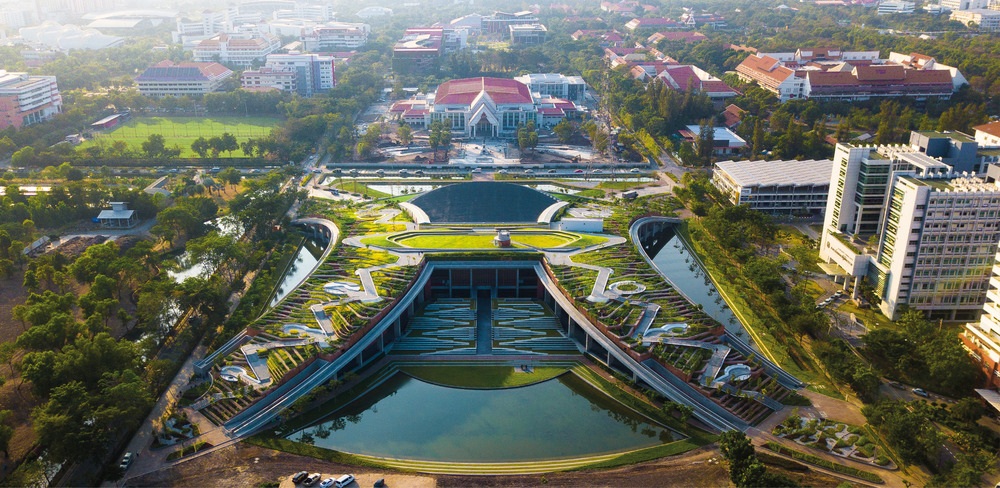Integrating landscape architecture with the ingenuity of traditional rice terraces, Thammasat University Rooftop Farm (TURF) incorporates sustainable food production, renewable energy, organic waste, water management and public space.

Amidst the climate crisis, food and water scarcity pose tremendous threats to human civilization. Once abundant agrarian societies, Bangkok and cities across Southeast Asia, have fallen victim to unregulated urbanization. To prioritize global food security, and the health of our people and the environment, cities must utilize neglected spaces to efficiently and sustainably produce food.
Repurposing 236,806 sq. ft. of wasted rooftop space, Thammasat University introduces an adaptive climate solution with Asia’s largest organic rooftop farm—Thammasat University Rooftop Farm (TURF). Integrating landscape architecture with the ingenuity of traditional rice terraces, TURF incorporates sustainable food production, renewable energy, organic waste, water management and public space. The mound shape architecture pays respect to the university’s former director, Dr Puey Ungphakorn. “Puey” means “mound under the tree,” or “nourishment,” in Thai. With an earthwork of rice terraces and modern green roof technology, the cascading rooftop absorbs, filters and slows down runoff 20 times more efficiently than conventional concrete rooftops.

As rainwater zigzags down the slopes, TURF grows food to feed the campus. At the end of its journey, four retention ponds await on each wing, mitigating and storing excessive rainfall for future use during drought. Carving into the mountainous architecture, TURF maximizes the terrain to create multi-functional public spaces, and a large amphitheatre with a 360-degree panoramic view of Bangkok. The roof is equipped with solar panels, capable of producing up to 500,000 watts per hour to irrigate the urban farm and power the building beneath it.


As lush green turns to dry brown, TURF is a realistic, but hopeful solution, putting urban dwellers back in tune with agricultural practices. Lessons on Thai agriculture, landscape and native soil are embedded into TURF, educating future leaders to adapt and embrace climate challenges, by building sustainable cities for generations to come.

Other images can be seen in the gallery down below
About LANDPROCESS
LANDPROCESS is a Bangkok-based landscape architecture and urban design firm founded in 2011 by landscape architect Kotchakorn Voraakhom.
At LANDPROCESS, situation in the city at sea level, landprocessors are helping to shift cities to a carbon neutral future and confronting the future climate uncertainty.
LANDPROCESS defends and expands carbon-sequestering landscapes such as green roof, water-efficient design, urban farming, urban forests, wetlands, and grasslands, helping to drawdown atmospheric carbon dioxide and use of sustainable materials and construction practices. All of these efforts also enable communities to better adapt and improve their resilience.
LANDPROCESS believes in power of process: finding the harmony between land and people through design. They are committed to productive public use in our projects. The dialogue of site, environment and people inform their process. They respect local culture, history, and existing sense of place.

